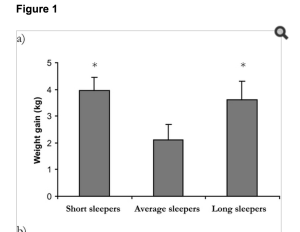I have had asthma and breathing difficulties since I was a baby so naturally I have trouble breathing while I sleep which in turn affects sleep quality. But I am curious to know if certain sleeping positions affect the severity of sleep apnea.
A longitudinal study was done by the Department of Psychiatry, Sleep Disorders Center, and Department of Otolaryngology Columbie University College of Physicians and Surgeons of New York on sleep apnea and sleeping positions.
Four people ages 48, 50, 52, and 60 who were diagnosed with sleep apnea were evaluated in a sleep study called a polysomnography. This type of study “records your brain waves, the oxygen level in your blood, heart rate and breathing, as well as eye and leg movements” during sleep (Mayo Clinic). While this test was happening, an observer would take note of sleeping positions throughout the time. They all had initial studies which were used as control studies. Then they were all observed at least three times each over a period of four months “avoiding the supine position for more than 75 per cent of their sleep time” (Amer. Journal of Otolaryngology). In comparison to the control studies, the results of the following studies showed an 80.4% reduction in sleep apnea when successfully refraining from the supine position.
As seen in Table 3 below from The American Journal of Otolaryngology, each of the four study subjects experienced more severe sleep apnea in the supine position (lying on back). In contrast the general pattern for the least amount of sleep apnea was experienced in the prone position (lying on stomach). A possible reason for this was thought to be because the tongue “fall(s) forward” making an open passageway to breathe, but this was determined to be false. It has not been determined for certain what causes the difference in sleep apnea. Now it is thought that it has something to do with the position of the head and neck in relation to opening up air passageways.

http://ac.els-cdn.ct
Two possible problematic factors of this study are small sample size and only using males. Basing a study off of four people can be anecdotal because some people may believe the results of this small study and seriously change sleeping habits because of it. Also the ages of the study subjects are all relatively close. In the discussion section of this study they discuss how breathing may change with age “when confounding factors such as decreased muscle tone, weight increase, smoking, alcohol use, present state of health, and medication use may offset the effectiveness of positionaI manipulation alone.”(American Journal of Otolaryngology)
Bottom line: although some cases in this study shows a correlation between sleeping positions and sleep apnea, there is not enough evidence to consider it causal. Another study done by the University of Maryland’s Medical Center disagrees with the study I discussed in this blog; it suggests that sleeping on ones side is the best for lessening sleep apnea. More studies similar to this one should be performed but with a larger sample size (both male and female subjects of different age groups) in order to get a wide range of results, maybe resulting in a better idea of the correlation.
Sources:
http://www.sciencedirect.com/science/article/pii/S0196070985800156
https://umm.edu/health/medical/reports/articles/obstructive-sleep-apnea























